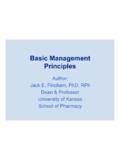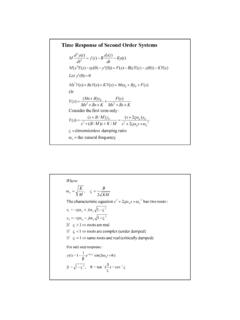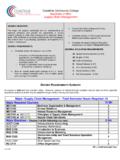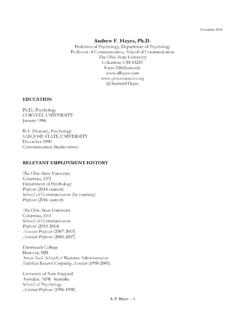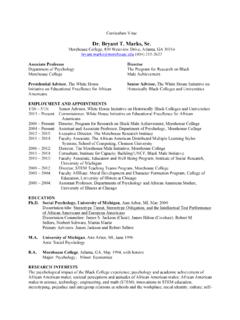Transcription of Behaviorism Theory - Faculty Web Server Directory Listing
1 Behaviorism Theory And Its Relation to Instructional Design Bryan Danley Nakita James Cameron Mims Andrew Simms 2 Overview History of Behaviorism Behaviorism Theorists Timeline of Development Definition of Behaviorism Application to Instructional Design Examples of Application How would you learn with this Theory applied to instruction intended for you? Summary 3 Overview History of Behaviorism Behaviorism Theorists Timeline of Development Definition of Behaviorism Application to Instructional Design Examples of Application How would you learn with this Theory applied to instruction intended for you? Summary 4 History of Behaviorism Formally founded by John B. Watson in 1913. 19th Century: Similar views as psychoanalytic and Gestalt movements in psychology. 20th Century: Result of cognitive revolution. 21st Century: "behavior analysis," is a thriving field. 5 Overview History of Behaviorism Behaviorism Theorists Timeline of Development Definition of Behaviorism Application to Instructional Design Examples of Application How would you learn with this Theory applied to instruction intended for you?
2 Summary 6 Behaviorism Theorists 7 Ivan Pavlov - Founder of classical conditioning; unconditioned stimulus causes unconditioned response John B. Watson - Coined the term Behaviorism - Studied how a certain stimuli led organisms to make responses - Believed psychology was only an objective observation of behavior Skinner - Radical Behaviorism : proposed that all action is determined at not free - Operant Response: behavior that control the rate at which specific consequences occur Overview History of Behaviorism Behaviorism Theorists Timeline of Development Definition of Behaviorism Application to Instructional Design Examples of Application How would you learn with this Theory applied to instruction intended for you? Summary 8 Timeline of Development 9 1863 Ivan Sechenov's Reflexes of the Brain was published introducing the concept of inhibitory responses in the central nervous system. 1900 Ivan Pavlov began studying the salivary response and other reflexes.
3 1913 John Watson's Psychology as a Behaviorist Views It was published outlining many of the main points of Behaviorism . 1920 Watson and assistant Rosalie Rayner conducted the famous "Little Albert" experiment. Timeline of Development (cont d) 10 1943 Clark Hull's Principles of Behavior was published. 1948 Skinner published Walden II in which he described a utopian society founded upon behaviorist principles. 1959 Noam Chomsky published his criticism of Skinner's Behaviorism , "Review of Verbal Behavior." 1971 Skinner published his book Beyond Freedom and Dignity, in which he argued that free will is an illusion. Overview History of Behaviorism Behaviorism Theorists Timeline of Development Definition of Behaviorism Application to Instructional Design Examples of Application How would you learn with this Theory applied to instruction intended for you? Summary 11 Definition of Behaviorism Behaviorism equates learning with behaviors that can be observed and measured.
4 Reinforcement is key to successful transfer through behavioristic learning. Strong emphasis on the stimulus, the response and the relationship between them. 12 Stimulus Response Repetition Behavioristic Learning Overview History of Behaviorism Behaviorism Theorists Timeline of Development Definition of Behaviorism Application to Instructional Design Examples of Application How would you learn with this Theory applied to instruction intended for you? Summary 13 Application of Instructional Design Students will work for things that bring them positive feelings. Use of a token system can reinforce positive academic performance. Students can utilize the art of repetition so that information remains concrete during the learning process. Small progressively sequenced tasks ensure that students remain focused during the learning process. 14 Overview History of Behaviorism Behaviorism Theorists Timeline of Development Definition of Behaviorism Application to Instructional Design Examples of Application How would you learn with this Theory applied to instruction intended for you?
5 Summary 15 Example of Application (1) A teacher provides a substantial list of practice problems for students to help them learn Algebra. 16 Stimulus The practice problems Response Correct solution to the problem Learning The repetition causes the student to learn Algebra. Example of Application (2) A computer simulation helping prospective airplane pilots learn to fly rewards the user with tokens for each successful simulation that, after collecting enough, they can cash in for flying a real plane. 17 Stimulus Reward of tokens for proper demonstration of knowledge. Response A feeling of accomplishment of getting closer to goal of flying. Learning The repetition causes the pilot to learn to fly, and the tokens help reinforce the proper demonstration of flight. Overview History of Behaviorism Behaviorism Theorists Timeline of Development Definition of Behaviorism Application to Instructional Design Examples of Application How would you learn with this Theory applied to instruction intended for you?
6 Summary 18 How would you learn with this Theory applied to instruction intended for you? Negative reinforcement for an undesired response could be more beneficial. Examples of what not to do can provide better understanding of the desired end goal. 19 Overview History of Behaviorism Behaviorism Theorists Timeline of Development Definition of Behaviorism Application to Instructional Design Examples of Application How would you learn with this Theory applied to instruction intended for you? Summary 20 Summary One of the three primary learning theories. The primary goal of Behaviorism is to form a relationship between a stimulus and a response. Formally founded by John B. Watson in 1913. 21 Questions? 22 Bibliography #The_founders_of_behaviorism -practice/ 23
